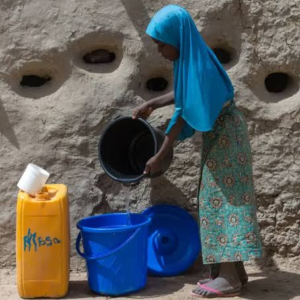Across a river in Nigeria’s Niger Delta region, plumes of dense black smoke rise into a grey sky, polluting the air for the hundreds of residents living nearby. This devastating scene of environmental degradation is captured by George Osodi, a Nigerian photographer renowned for documenting social and environmental injustices through his lens.
Photography is one of the most far-reaching forms of communication, capable of transcending language barriers and evoking emotions that words often fail to express. In Nigeria, this art form has become a powerful tool for amplifying the country’s socio-economic struggles while also celebrating its rich cultural diversity. Through the work of photographers like Aisha Augie-Kuta and George Osodi, photography has become a medium for giving a voice to marginalised communities and driving social change.
Capturing the Environmental Crisis
Born in 1974 in bustling Lagos, George Osodi’s work focusses on documenting the socio-political landscape of the country, especially in the Niger Delta. A former photojournalist for the Associated Press, Osodi transitioned into fine art photography, where he continues to use his camera to highlight the environmental degradation and exploitation affecting the Niger Delta’s local communities.
For years, Osodi has travelled through the region, capturing images of oil spills, gas flaring, and the destruction of ecosystems. His renowned series, Oil Rich Niger Delta, contrasts the area’s wealth of natural resources with the stark poverty of its people. His haunting images of polluted rivers, destroyed farmland, and impoverished communities critique the negligence of the government and the greed of corporations.
Osodi’s work has brought global attention to the plight of the Niger Delta, challenging the conventional narrative of Nigeria’s oil industry as a source of economic growth. His photography documents environmental disaster while also indicting systemic corruption and injustice, giving a voice to the voiceless.
His influence is recognised globally, with exhibitions at prestigious venues such as London’s Tate Modern and Paris’s Musée du Quai Branly. Osodi has also received numerous awards, including the Fuji Africa Photographer of the Year Award in 2004 and the National Geographic All Roads Photography Program award. His work continues to appear in international publications, further amplifying the voices of the communities he documents.
In addition to environmental activism, Osodi’s series Kings of Nigeria focusses on the country’s traditional rulers, providing a glimpse into Nigeria’s rich cultural heritage. While this project does not directly address social justice, it underscores the need to preserve culture and identity amidst modernisation and globalisation.
Using Photography to Empower Women
Aisha Augie-Kuta is also another of Nigeria’s most celebrated photographers, known for her striking images that focus on women’s empowerment, cultural diversity, and social justice. Born in 1980 in Zaria, Kaduna State, she grew up in an environment rich in culture, which later influenced her work. What began as a personal passion for photography quickly evolved into a platform for advocacy and storytelling.
As a woman and a mother, Augie-Kuta draws from her own experiences to empathise with the challenges women face in Nigeria’s patriarchal society. Through her photography, she challenges societal norms that often restrict the roles and opportunities available to women, particularly in Northern Nigeria. Her work sheds light on critical issues such as gender inequality, access to education, and economic empowerment for women.

One of her most impactful projects, “Icons of Unity,” features women from different cultural and religious backgrounds across Nigeria, dressed in traditional attire to symbolise the country’s unity in diversity. This series not only celebrates Nigeria’s heritage but also serves as a visual protest against rising sectarian violence, calling for peace and mutual understanding.
Augie-Kuta’s work has earned her widespread recognition, including the prestigious Future Awards Africa Prize for Creative Professional in 2011 and a spot on the 2019 list of 100 Most Influential African Women by Women’s Advancement Deeply. She has also mentored many young photographers and creatives, guiding them to use their art for advocacy and storytelling.
Beyond photography, Augie-Kuta has ventured into politics, serving as the Special Adviser to the Minister of Finance on Digital Communications Strategy since 2019. Through her career, she demonstrates that photography is more than just artistic expression—it’s a powerful tool for driving social justice, sparking dialogue, and inspiring movements.
Photojournalism for Social Justice
Aisha Augie-Kuta and George Osodi illustrate how photography can be a powerful catalyst for social justice movements in Nigeria. Their work transcends artistic boundaries, serving as tools for advocacy, protest, and storytelling. Through their lenses, they capture critical issues like gender inequality, environmental degradation, and cultural preservation, giving voice to those who have been marginalised.
As the world grapples with social justice movements, the role of photography in fostering empathy and raising awareness for change cannot be overstated. Through the brilliant work of photographers, the camera becomes a window into both the beauty and struggles of humanity, reminding us of our shared responsibility to create a more just and equitable world.
Photographers George Osodi and Aisha Augie-Kuta significantly impact social justice in Nigeria through their work, using photography to highlight critical issues and marginalized voices. Osodi, renowned for capturing the Niger Delta's environmental crises, documents oil spills and ecological degradation while pointing to systemic negligence and corruption. His series "Oil Rich Niger Delta" and "Kings of Nigeria" juxtapose wealth and poverty and celebrate cultural heritage globally recognized. Meanwhile, Augie-Kuta focuses on women's empowerment and cultural diversity in Nigeria. Her series "Icons of Unity" portrays Nigeria's cultural unity to counteract sectarian violence, and she advocates for gender equality through her work. Beyond photography, her influence extends into politics, serving as Special Adviser on Digital Communications Strategy. Both photographers demonstrate the pivotal role of photojournalism in advocating for social justice, fostering empathy, and inspiring change.






